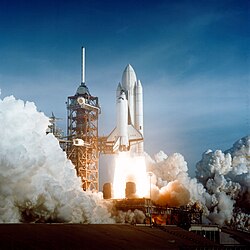Draft:Comparison of ocean and space exploration
Submission declined on 2 March 2025 by KylieTastic (talk).
Where to get help
How to improve a draft
You can also browse Wikipedia:Featured articles and Wikipedia:Good articles to find examples of Wikipedia's best writing on topics similar to your proposed article. Improving your odds of a speedy review To improve your odds of a faster review, tag your draft with relevant WikiProject tags using the button below. This will let reviewers know a new draft has been submitted in their area of interest. For instance, if you wrote about a female astronomer, you would want to add the Biography, Astronomy, and Women scientists tags. Editor resources
|  |
 Comment: Appears to be original research KylieTastic (talk) 22:47, 2 March 2025 (UTC)
Comment: Appears to be original research KylieTastic (talk) 22:47, 2 March 2025 (UTC)
Both ocean exploration and space exploration are critical for scientific advancement, yet they differ significantly in scope, challenges, and funding. While space exploration has led to moon landings, Mars rovers, and satellite technology, ocean exploration has revealed deep-sea ecosystems, hydrothermal vents, and underwater geology. Despite the vast unknowns of Earth's oceans, space exploration receives far more attention and investment. This article compares the extent, challenges, importance, and public perception of ocean and space exploration.[1]

Extent of Exploration
[edit]Space exploration
[edit]Space exploration has advanced rapidly since the launch of Sputnik 1 [2](1957). Currently, thousands of satellites orbit Earth, and missions like the Voyager probes, Mars rovers, and the James Webb Space Telescope (JWST) continue to expand our knowledge. Human spaceflight, including the Apollo moon landings[3] (1969–1972) and the International Space Station (ISS), has furthered our understanding of space.

Ocean exploration
[edit]Despite covering 71% of Earth’s surface, over 80% of the ocean remains unexplored[4] Technologies like sonar mapping, remotely operated vehicles (ROVs), and deep-sea submersibles have provided insight into marine life and geology. The Mariana Trench, the deepest oceanic point, was first explored by Jacques Piccard and Don Walsh in 1960 aboard Trieste and later by James Cameron in Deepsea Challenger (2012).[5]

Challenges
[edit]Extreme environments
[edit]Both space and the deep ocean present hostile conditions:
- Space: Vacuum, radiation, extreme temperatures, and microgravity.[6]
- Ocean: High pressure (over 1,000 times atmospheric pressure in deep trenches), complete darkness, and corrosive seawater.[7]
Technological limitations
[edit]- Spacecraft are designed to withstand cosmic radiation, vacuum and micrometeoroids, while deep-sea vehicles must endure immense water pressure.
- Space telescopes (e.g., Hubble, JWST) allow us to map distant galaxies[8], but deep-sea mapping is still limited due to the difficulty of sending signals through water[9].[10]
Scientific and economic importance
[edit]Space exploration
[edit]- Technological advancements (e.g., GPS, weather satellites).
- Potential for extraterrestrial colonization (e.g., Mars missions).
- Discovery of exoplanets and cosmic phenomena.
Ocean exploration
[edit]- Climate and weather studies (oceans regulate global temperatures).
- Biodiversity research (discovery of deep-sea species).
- Resource potential (deep-sea mining, marine biotechnology).
Public perception and funding
[edit]Space programs like NASA, ISRO, ESA, and SpaceX receive global media attention, while ocean exploration remains underfunded. The U.S. space budget (NASA: ~$25 billion in 2024)[11] is significantly higher than ocean research funding (NOAA: ~$6 billion). Public interest leans towards space, often overlooking Earth's unexplored depths.
Conclusion
[edit]Both ocean and space exploration are crucial for scientific progress, yet ocean research is often neglected. While space captivates the imagination with planetary missions and the search for extraterrestrial life, oceans hold untapped resources and mysteries. Investing in both fields will advance our understanding of the universe and our own planet.
See also
[edit]References
[edit]- ^ "How much of the ocean has been explored?". NOAA. Retrieved 2025-03-02.
- ^ "Sputnik and the Dawn of the Space Age". NASA. National Aeronautics and Space Administration. Retrieved 23 March 2025.
- ^ "Apollo Lunar Landings". NASA NSSDC. National Space Science Data Center. Retrieved 23 March 2025.
- ^ "How much of the ocean have we explored?". NOAA Ocean Service. National Oceanic and Atmospheric Administration (NOAA). 25 February 2021. Retrieved 23 March 2025.
- ^ "Space exploration – Facts & statistics". Statista. Retrieved 2025-03-02.
- ^ "Space Hazards and Risks". European Space Agency (ESA). ESA. Retrieved 23 March 2025.
- ^ "The Challenges of Deep-Sea Exploration". Woods Hole Oceanographic Institution (WHOI). WHOI. Retrieved 23 March 2025.
- ^ "How Mapping Is Used by NASA & Applications of GIS in Space". USC GIS. University of Southern California. April 2019. Retrieved March 23, 2025.
- ^ "Seafloor Mapping". NOAA Ocean Exploration. National Oceanic and Atmospheric Administration. July 2021. Retrieved March 23, 2025.
- ^ Tony Bradley (2024-08-18). "Explore The Ocean's Depths With National Geographic's Oceanxplorers". Forbes. Retrieved 2025-03-02.
- ^ "Congress Clears FY2024 Funding for NASA, NOAA, FAA". Space Policy Online. March 2024. Retrieved 23 March 2025.

- in-depth (not just passing mentions about the subject)
- reliable
- secondary
- independent of the subject
Make sure you add references that meet these criteria before resubmitting. Learn about mistakes to avoid when addressing this issue. If no additional references exist, the subject is not suitable for Wikipedia.